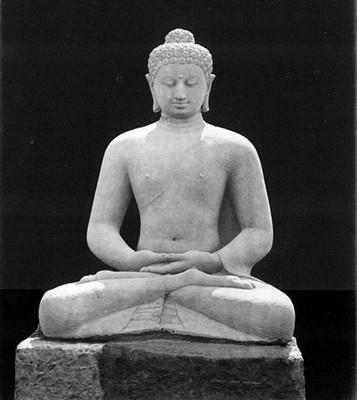(单词翻译:单击)
All religions have to confront the key question-how can the infinite, the boundless, be apprehended? How can we, humans, draw near to the other, God? Some aim to achieve it through chanting, some through words alone, but most faiths have found images useful to focus human attention on the divine. In this week's programmes, I'll be looking at how, a little under two thousand years ago, great religions used the visual as a route to prayer. Is it more than an extraordinary coincidence that at about the same moment Christianity, Hinduism and Buddhism all start showing Christ, Hindu gods and the Buddha in human form? Coincidence or not, all three religions established then artistic conventions which are still very much alive today.
所有宗教都需要面对一个关键问题,即如何理解永恒与无限,人类又如何亲近神?有的宗教采用了吟诵的方式,有的则完全依赖文字,大部分宗教都认识到,神像能让凡人感受神的力量。本期节目当中,我会带领大家了解了解2000多年前伟大宗教对朝圣者的意义所在。在大约两千年前,几大宗教都开始用神像来传道。基督教、佛教和印度教几乎在同一时期采用人类的形象来表现本教神灵。这难道仅仅是巧合?不管真相如何,三大宗教都在这一时期创造出了流传至今神的形象。
Around 1,800 years ago, Buddhism had already been in existence for centuries. The historical Buddha was a prince of the Ganges region in North India in the fifth century BC, who abandoned his royal life to become a wandering ascetic, wanting to comprehend and therefore to overcome the roots of human suffering. After many experiences he finally sat under a pipal tree and meditated without moving for 49 days until, at last, he achieved enlightenment-freedom from greed, hate, and delusion. At this moment, he became the Buddha-the "Enlightened" or the "Awakened One". He passed on his dharma (his way, his teaching) to monks and to missionaries who eventually travelled across the vast expanses of Asia. As the Buddhist message spread north, it passed into the region known as Gandhara, the area in what is now north-eastern Pakistan, around Peshawar, in the foothills of the Himalayas.
188年前,彼时佛教已经存在了数百年。据佛教文献记载,佛陀曾是公元前15世纪北印度迦毗罗卫国的一位王子,他放弃了王族生活,成为一名苦行僧,想参透人生的苦痛与无常,助人脱离苦海。在漫长的苦行生活之后,他在一棵菩提树下打坐,悟道49天后终于开悟,脱离了人生的贪、嗔、痴。从那一刻起,他便成了佛陀,意为“觉者”或“悟者”。 他向僧侣传授自己的佛法,僧侣们再将其传向亚洲各地。佛法在向北传播的途中来到了今巴基斯坦东北部的犍陀罗,即喜马拉雅山山脚的白沙瓦附近。



